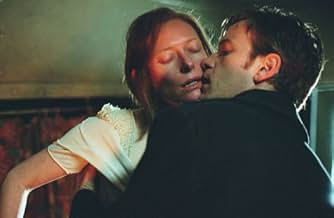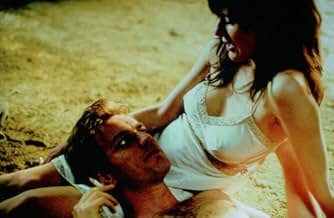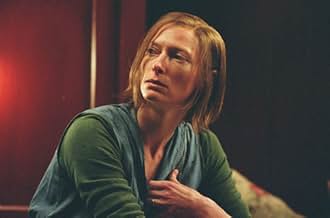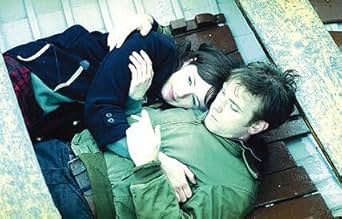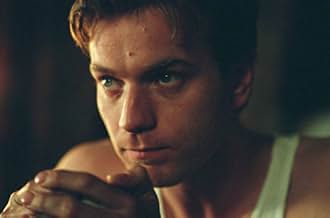CALIFICACIÓN DE IMDb
6.3/10
15 k
TU CALIFICACIÓN
Un joven vagabundo que trabaja en una barcaza fluvial interrumpe la vida de sus empleadores mientras oculta el hecho de que sabe más sobre una mujer muerta encontrada en el río de lo que adm... Leer todoUn joven vagabundo que trabaja en una barcaza fluvial interrumpe la vida de sus empleadores mientras oculta el hecho de que sabe más sobre una mujer muerta encontrada en el río de lo que admite.Un joven vagabundo que trabaja en una barcaza fluvial interrumpe la vida de sus empleadores mientras oculta el hecho de que sabe más sobre una mujer muerta encontrada en el río de lo que admite.
- Dirección
- Guionistas
- Elenco
- Premios
- 7 premios ganados y 17 nominaciones en total
- Dirección
- Guionistas
- Todo el elenco y el equipo
- Producción, taquilla y más en IMDbPro
Opiniones destacadas
Who is Alexander Trocchi? He's the author of a Brit Beat cult novel called Young Adam and a fascinating figure of whose writing William S. Burroughs once said `He has been there and brought it all back.' Fledgling Scottish director David Mackenzie has brought it all back to the screen, having performed the difficult feat of getting adequate funds to film Young Adam and gathered an able cast headed by Ewan MacGregor, Tilda Swinton, and Peter Mullen to act in it.
A worthwhile project and a logical one for those involved. It makes sense that MacGregor of Trainspotting and Shallow Grave and Mullen of Trainspotting should try to jumpstart British cinema again by bringing this bold forgotten classic set in Scotland to the screen. The result may not be a revolution, but it's a good watch, a beautiful dark lusty little movie with some rare nooks and crannies to it.
Indeed it was Trainspotting author Irvine Welsh who spearheaded the revival of interest in Trocchi and his novel. Glasgow-born Trocchi (who died in '84) spent so many years as a wild drug intellectual figurehead in Paris, the US, and England that people had pretty much forgotten he'd been a good writer admired for his style and his "sexistential" plots.
Besides being a heroin-opium-cocaine-marijuana addict, pimp, magazine editor, translator and rare book seller who never gave up the wan hope that he'd do some good writing again, Trocchi once also penned pornography for cash. His own lust sticks out all over this story, as does his freewheeling sensualist nihilism.
The sexually predatory Joe (MacGregor) is a failed writer with a dark secret who's run off to become a hired hand on a barge running coal along the Forth and Clyde canal between Glasgow and Edinburgh. Ella Gault -- a typically powerful, merciless role for the bold and talented Swinton -- is the barge owner, often contemptuous of her husband Les (Peter Mullen). It's obvious Joe and Ella are going to be between the sheets in short order. We suspect also that as in Jean Vigo's classic Parisian barge film L'Atalante, somebody's going to have to leave. The small world is made even smaller by the presence of a son, `the kid' Jim (Jack McElhone) who peeks through cracks to see the humping. This is the Kitchen Sink School of adultery.
Before long Les gets the picture and moves off, but we know from flashbacks and concurrent affairs that Joe is a stranger to commitment. Eventually it emerges that he knew a lot more than he said about the body of the girl in the slip he and Les fished out of the canal at the movie's outset. The story that unfolds about that body and its owner is a huge example of Joe's endless capacity for non-commitment. Could it be there's more than a little of Alexander Trocchi in Joe Taylor? You bet. But Joe's a pre-drug Trocchi whose only substances are the alcohol he gets in pubs and the cigarettes he always has dangling from his mouth.
The lusty nihilism of this story may owe something to Henry Miller, but it's more usually described as a sensual and earthy version of Camus's The Stranger, and like The Stranger, Young Adam has a trial at the end (it seems somewhat patched in, and it is it's not in the book). Joe experiences greater priapic pleasure than Camus's Meursault. He doesn't seem to get a lot of fun out of it, though. He's a failed author making it with every woman who comes along to forget his writer's block and his guilt. He's a handsome, sexy devil who doesn't so much seduce women as look them in the eye and wait to pounce. It's hard to see how anybody else could be better than Ewan McGregor in this role. Working on home turf again for a change -- like Colin Farrell in the casual, quick-witted recent Irish film Intermission -- MacGregor has never looked or acted better. Swinton, Mullen, and Emily Mortimer (as the former girlfriend) are equally good.
Mackenzie's postwar Glasgow canal world is an authentic-feeling place where the interiors are chiaroscuro and exteriors bleached out and tinged with yellow. The shots are often striking in unexpected ways. The trouble with the movie is it isn't emotionally affecting. The wild sex scenes including the notorious ketchup rape -- are no more than bodies rudely colliding. There's more beauty in the arch of McGregor's eyebrows or the rust of a barge in the late sunlight. There's a grimy glamour also to the barge interiors, the luminous air of the pubs, canalside humps and slick dark streets; but the hero's aimlessness destroys momentum and the movie fizzles out at the end.
As Joe drifts through Young Adam the present is mixed with the flashbacks of an equally aimless past and things get a bit confusing. There isn't any of the acid trip intensity (and ultimate clarity) of Cronenberg's brilliant Spider and the pace drags at times. Let's hope Mackenzie's work on his next movie pans out: it's an adaptation of Spider author Patrick McGrath's novel Asylum. His first movie was a fiasco. This interesting effort is his second. With luck he may make another leap forward next time.
A worthwhile project and a logical one for those involved. It makes sense that MacGregor of Trainspotting and Shallow Grave and Mullen of Trainspotting should try to jumpstart British cinema again by bringing this bold forgotten classic set in Scotland to the screen. The result may not be a revolution, but it's a good watch, a beautiful dark lusty little movie with some rare nooks and crannies to it.
Indeed it was Trainspotting author Irvine Welsh who spearheaded the revival of interest in Trocchi and his novel. Glasgow-born Trocchi (who died in '84) spent so many years as a wild drug intellectual figurehead in Paris, the US, and England that people had pretty much forgotten he'd been a good writer admired for his style and his "sexistential" plots.
Besides being a heroin-opium-cocaine-marijuana addict, pimp, magazine editor, translator and rare book seller who never gave up the wan hope that he'd do some good writing again, Trocchi once also penned pornography for cash. His own lust sticks out all over this story, as does his freewheeling sensualist nihilism.
The sexually predatory Joe (MacGregor) is a failed writer with a dark secret who's run off to become a hired hand on a barge running coal along the Forth and Clyde canal between Glasgow and Edinburgh. Ella Gault -- a typically powerful, merciless role for the bold and talented Swinton -- is the barge owner, often contemptuous of her husband Les (Peter Mullen). It's obvious Joe and Ella are going to be between the sheets in short order. We suspect also that as in Jean Vigo's classic Parisian barge film L'Atalante, somebody's going to have to leave. The small world is made even smaller by the presence of a son, `the kid' Jim (Jack McElhone) who peeks through cracks to see the humping. This is the Kitchen Sink School of adultery.
Before long Les gets the picture and moves off, but we know from flashbacks and concurrent affairs that Joe is a stranger to commitment. Eventually it emerges that he knew a lot more than he said about the body of the girl in the slip he and Les fished out of the canal at the movie's outset. The story that unfolds about that body and its owner is a huge example of Joe's endless capacity for non-commitment. Could it be there's more than a little of Alexander Trocchi in Joe Taylor? You bet. But Joe's a pre-drug Trocchi whose only substances are the alcohol he gets in pubs and the cigarettes he always has dangling from his mouth.
The lusty nihilism of this story may owe something to Henry Miller, but it's more usually described as a sensual and earthy version of Camus's The Stranger, and like The Stranger, Young Adam has a trial at the end (it seems somewhat patched in, and it is it's not in the book). Joe experiences greater priapic pleasure than Camus's Meursault. He doesn't seem to get a lot of fun out of it, though. He's a failed author making it with every woman who comes along to forget his writer's block and his guilt. He's a handsome, sexy devil who doesn't so much seduce women as look them in the eye and wait to pounce. It's hard to see how anybody else could be better than Ewan McGregor in this role. Working on home turf again for a change -- like Colin Farrell in the casual, quick-witted recent Irish film Intermission -- MacGregor has never looked or acted better. Swinton, Mullen, and Emily Mortimer (as the former girlfriend) are equally good.
Mackenzie's postwar Glasgow canal world is an authentic-feeling place where the interiors are chiaroscuro and exteriors bleached out and tinged with yellow. The shots are often striking in unexpected ways. The trouble with the movie is it isn't emotionally affecting. The wild sex scenes including the notorious ketchup rape -- are no more than bodies rudely colliding. There's more beauty in the arch of McGregor's eyebrows or the rust of a barge in the late sunlight. There's a grimy glamour also to the barge interiors, the luminous air of the pubs, canalside humps and slick dark streets; but the hero's aimlessness destroys momentum and the movie fizzles out at the end.
As Joe drifts through Young Adam the present is mixed with the flashbacks of an equally aimless past and things get a bit confusing. There isn't any of the acid trip intensity (and ultimate clarity) of Cronenberg's brilliant Spider and the pace drags at times. Let's hope Mackenzie's work on his next movie pans out: it's an adaptation of Spider author Patrick McGrath's novel Asylum. His first movie was a fiasco. This interesting effort is his second. With luck he may make another leap forward next time.
If you love film, you know the first Polanski project, "Knife in the Water." It is a simple project: a couple, plus an extra man, confined on a boat. Sex.
It is an important project, taking the seat of the characters and extending it into a space around them. The challenge for the actors is to project out into a haze that surrounds them. It only works because the space is confined, incidentally in a boat. Orson Welles conceived the idea but his project was unfinished. Polanski finished it.
Polanski's project was told from the perspective of the couple. Presumably the man is a lawyer with his out-of-law wife (his mistress). It is all about laws of various kinds.
Now imagine a project with the identical approach but told from the point of the drifter. What is his story? What is his haze?
Watch the two together if you dare. This time around we have a more ostentatious art: beautiful staging, terrific lighting, hazy score. Absolutely controlled and contained acting. And yet at the same time we have the haze extending to grit, humanity, sweat, rutting.
This time around that reality gives us more explicit and human sex. And more explicit law.
You need to watch this, folks. It is intrinsically deep and engaging. Slow. Meditative. As with a Rembrandt, the meditative but intense emotion draws you into the haze, here shown many times as shadow (or coal dust, or water).
One of our most serious actresses is Ms Tilda. I'll watch anything she chooses to throw herself into.
Ewan chooses intelligent projects. You will discover that our drifter is a writer trying to do something different. It is why things are so hazy and non-linear, the typewriter underwater. The one explicitly folded shot quotes his "Moulin Rouge" folded typing.
If you want to understand how actors put themselves on their skin, then their sweat, then the haze around them that is shared, then into your own haze... watch this.
Ted's Evaluation -- 3 of 3: Worth watching.
It is an important project, taking the seat of the characters and extending it into a space around them. The challenge for the actors is to project out into a haze that surrounds them. It only works because the space is confined, incidentally in a boat. Orson Welles conceived the idea but his project was unfinished. Polanski finished it.
Polanski's project was told from the perspective of the couple. Presumably the man is a lawyer with his out-of-law wife (his mistress). It is all about laws of various kinds.
Now imagine a project with the identical approach but told from the point of the drifter. What is his story? What is his haze?
Watch the two together if you dare. This time around we have a more ostentatious art: beautiful staging, terrific lighting, hazy score. Absolutely controlled and contained acting. And yet at the same time we have the haze extending to grit, humanity, sweat, rutting.
This time around that reality gives us more explicit and human sex. And more explicit law.
You need to watch this, folks. It is intrinsically deep and engaging. Slow. Meditative. As with a Rembrandt, the meditative but intense emotion draws you into the haze, here shown many times as shadow (or coal dust, or water).
One of our most serious actresses is Ms Tilda. I'll watch anything she chooses to throw herself into.
Ewan chooses intelligent projects. You will discover that our drifter is a writer trying to do something different. It is why things are so hazy and non-linear, the typewriter underwater. The one explicitly folded shot quotes his "Moulin Rouge" folded typing.
If you want to understand how actors put themselves on their skin, then their sweat, then the haze around them that is shared, then into your own haze... watch this.
Ted's Evaluation -- 3 of 3: Worth watching.
By halfway through this story, the biblical underpinnings become firmly apparent: this is an allegory for The First Man, and his base, animal instincts. Hence, it's a tried and true thematic device, used by many authors: for example, in the tradition of Saturday Night and Sunday Morning (1960), Sons and Lovers (1960), and many other films that explore sexual transgressions coupled with (no pun intended) unrelenting naked desire, the author, Alexander Trocchi, presents his version of the modern Adam – always on the make, and totally suffused with his own animal desires and his pretentious efforts at self-fulfillment.
In truth, the Young Adam of this story, Joe Taylor (Ewan McGregor) is portrayed as, at best, misanthropic and crypto-misogynistic. Taken to extreme, Young Adam could be borderline sociopath in another story and setting. This is not satire, however, as with Patrick Bateman (deliciously played by Christian Bale) in American Psycho (2000). No, this is a reality that existed in the 1950s setting of the novel and which remains a stigma within all humans today. In truth, I think it was St.Jerome, in one of the biblical stories, who moaned about his need for release from his sexual depravities. But, nothing much changes in human relationships, from antiquity to now.
In a manner, you can look at this story as Ingmar Bergman for the poorer masses – another version of dirty scenes from a dirty marriage: because in this plot, the unwashed Joe is presented with a moral dilemma as the story progresses: am I truly my brother's keeper? So, the question for him, finally, is: will he be able to rise above his animality and achieve a humanity that he has avoided throughout his young life to date?
McGregor's acting in this story is stunning; so also Tilda Swinton as Young Adam's latest sexual conquest (Ella) aboard a coal-carrying canal barge (aptly named Atlantic Eve) where he thinks he's escaping from his responsibilities. Poor Joe – he's such a slave to his desires, he just can't stop: on the barge, in alleyways, under trucks, on the floor, against a canal wall – anywhere for a quick hit, so that he can forget about his failure as an aspiring writer, among other things. To that extent, one is reminded of the controlled excesses in Last Tango in Paris (1972), where Marlon Brando gave his finest performance as another poor slave to animal passions. And, while on the topic, how can anybody forget sociopathic Frank Booth (Dennis Hopper) and his velvet fetish in Blue Velvet (1986)?
On the other hand, the same theme has been used for light or outrageous comedy with films such as Tom Jones (1963), Kubrick's masterpiece Barry Lyndon (1975) and Boogie Nights (1997), all worth seeing, simply because none hurt the psyche.
But, getting back to Joe – so ordinary Joe, a symbol for all men, young and older – as he fills his days as a canal-worker-slave, obtaining relief from boredom only when satisfying his slavish work in a different type of living canal. Significantly, the director has the barge enter a few dark, moist tunnels through which the barge travels – and with the men treading all over it, albeit somewhat delicately, and just enough to make sure they exit carefully.
You don't get symbols like that too often in films; a delight to savor, for the location and the execution.
The denouement for the story arrives when our Joe makes his moral choice – a choice so fundamental, you stare at his face, watching his look, the tortured eyes, the mouth, his eyebrows, all as an expression of the raging dilemma within his animal/human brain. Rarely will you see such a choice done so well, and with such resigned finality – and a mirror for all of us to ponder in our darkest hours.
The supporting cast is exemplary, while the photography, sound and editing match the needs for such an important – and yet ordinary – story to be portrayed so professionally. Occasionally, it was momentarily difficult to sort out past, present and future; but not so much that the structure caused any unresolved confusion.
The NC-17 and R ratings are appropriate: this is not a film for children or adolescents. But, I highly recommend it for all adults – young and old – who are not afraid to look critically within themselves.
May 10, 2011.
In truth, the Young Adam of this story, Joe Taylor (Ewan McGregor) is portrayed as, at best, misanthropic and crypto-misogynistic. Taken to extreme, Young Adam could be borderline sociopath in another story and setting. This is not satire, however, as with Patrick Bateman (deliciously played by Christian Bale) in American Psycho (2000). No, this is a reality that existed in the 1950s setting of the novel and which remains a stigma within all humans today. In truth, I think it was St.Jerome, in one of the biblical stories, who moaned about his need for release from his sexual depravities. But, nothing much changes in human relationships, from antiquity to now.
In a manner, you can look at this story as Ingmar Bergman for the poorer masses – another version of dirty scenes from a dirty marriage: because in this plot, the unwashed Joe is presented with a moral dilemma as the story progresses: am I truly my brother's keeper? So, the question for him, finally, is: will he be able to rise above his animality and achieve a humanity that he has avoided throughout his young life to date?
McGregor's acting in this story is stunning; so also Tilda Swinton as Young Adam's latest sexual conquest (Ella) aboard a coal-carrying canal barge (aptly named Atlantic Eve) where he thinks he's escaping from his responsibilities. Poor Joe – he's such a slave to his desires, he just can't stop: on the barge, in alleyways, under trucks, on the floor, against a canal wall – anywhere for a quick hit, so that he can forget about his failure as an aspiring writer, among other things. To that extent, one is reminded of the controlled excesses in Last Tango in Paris (1972), where Marlon Brando gave his finest performance as another poor slave to animal passions. And, while on the topic, how can anybody forget sociopathic Frank Booth (Dennis Hopper) and his velvet fetish in Blue Velvet (1986)?
On the other hand, the same theme has been used for light or outrageous comedy with films such as Tom Jones (1963), Kubrick's masterpiece Barry Lyndon (1975) and Boogie Nights (1997), all worth seeing, simply because none hurt the psyche.
But, getting back to Joe – so ordinary Joe, a symbol for all men, young and older – as he fills his days as a canal-worker-slave, obtaining relief from boredom only when satisfying his slavish work in a different type of living canal. Significantly, the director has the barge enter a few dark, moist tunnels through which the barge travels – and with the men treading all over it, albeit somewhat delicately, and just enough to make sure they exit carefully.
You don't get symbols like that too often in films; a delight to savor, for the location and the execution.
The denouement for the story arrives when our Joe makes his moral choice – a choice so fundamental, you stare at his face, watching his look, the tortured eyes, the mouth, his eyebrows, all as an expression of the raging dilemma within his animal/human brain. Rarely will you see such a choice done so well, and with such resigned finality – and a mirror for all of us to ponder in our darkest hours.
The supporting cast is exemplary, while the photography, sound and editing match the needs for such an important – and yet ordinary – story to be portrayed so professionally. Occasionally, it was momentarily difficult to sort out past, present and future; but not so much that the structure caused any unresolved confusion.
The NC-17 and R ratings are appropriate: this is not a film for children or adolescents. But, I highly recommend it for all adults – young and old – who are not afraid to look critically within themselves.
May 10, 2011.
What an emotionless portrayal of an emotionless man. Ewan yet again proves that he is a force in both the Hollywood community and in the independent forum. Not only for having the bravery to go against American cliché and fight to keep his full frontal nudity in the film, but also for having the gumption to take this role. This is not your average character. Joe is not your normal 'hero'. In fact, I would go so far as to say that he represents all of us. He is, sadly, our 'hero'. Joe (and Ewan portrays this perfectly) is constantly looking for happiness and acceptance, but somehow cannot find it due to the sexual urges that he has. It is interesting to see him want to have emotion, but yet have no issues with sleeping with another man's wife. This is a story of maturity for Joe, but sadly we do not ever see it. When I was watching this film I was continually thinking of the film Alfie (not the new release, but the older) in which a man embarks on several relationships and ultimately ends up with nothing. That is very similar to the story that we have here, only Young Adam is much grittier and darker
and, well, more explicit.
So many times in cinema we watch two actors give heartbreaking performances on screen, but just do not have the chemistry needed to really pull together those intense sex scenes. That is not the case here. The chemistry and raw emotion between Ewan and Tilda Swinton is phenomenal. I have not seen a better match up in cinema in a long time. This successfully added that extra intensity to their moments of glory. I was able to feel and see their emotion and passion for each other on the screen. It was exactly what this film needed to reach the next level.
I know this story is based off a book, but I felt that director David Mackenzie did a fantastic job of setting the mood and the scenes. He amazingly built this sense of claustrophobia that surrounded Joe from not only inside the boat, but also under the truck and in the second apartment. There was even that feeling at the trial. This claustrophobia is one of the reasons why Joe never stays in one place for very long. While some will argue that he is nothing more than a heartless womanizer and a coward, I saw him as a tragic spirit searching for the lifelong happiness that he could never find. His conscious was too heavy on him to ever find that perfect place. Mackenzie allowed Ewan to find this character, and this powerful drama was transformed well into the screen.
Finally, I would like to add that Ewan would not have been worth seeing in this film if it wasn't for the impressive Tilda Swinton who is seemingly in everything lately and gives nothing less than 110%. I have not seen anything that she has been in that was anything below good. She is our next Oscar winner and one of those actresses that are not afraid to get dirty. Her portrayal of Ella is no different. While others would have simply just played the part, Swinton creates the part and gives this film the backbone that it deserves. She nearly steals every scene from Ewan, and that is impressive.
Overall, Young Adam is a deeply disturbing and depressing film that is not for everyone, but will be enjoyed by those that are fans of this genre.
Grade: **** out of *****
So many times in cinema we watch two actors give heartbreaking performances on screen, but just do not have the chemistry needed to really pull together those intense sex scenes. That is not the case here. The chemistry and raw emotion between Ewan and Tilda Swinton is phenomenal. I have not seen a better match up in cinema in a long time. This successfully added that extra intensity to their moments of glory. I was able to feel and see their emotion and passion for each other on the screen. It was exactly what this film needed to reach the next level.
I know this story is based off a book, but I felt that director David Mackenzie did a fantastic job of setting the mood and the scenes. He amazingly built this sense of claustrophobia that surrounded Joe from not only inside the boat, but also under the truck and in the second apartment. There was even that feeling at the trial. This claustrophobia is one of the reasons why Joe never stays in one place for very long. While some will argue that he is nothing more than a heartless womanizer and a coward, I saw him as a tragic spirit searching for the lifelong happiness that he could never find. His conscious was too heavy on him to ever find that perfect place. Mackenzie allowed Ewan to find this character, and this powerful drama was transformed well into the screen.
Finally, I would like to add that Ewan would not have been worth seeing in this film if it wasn't for the impressive Tilda Swinton who is seemingly in everything lately and gives nothing less than 110%. I have not seen anything that she has been in that was anything below good. She is our next Oscar winner and one of those actresses that are not afraid to get dirty. Her portrayal of Ella is no different. While others would have simply just played the part, Swinton creates the part and gives this film the backbone that it deserves. She nearly steals every scene from Ewan, and that is impressive.
Overall, Young Adam is a deeply disturbing and depressing film that is not for everyone, but will be enjoyed by those that are fans of this genre.
Grade: **** out of *****
Spoiler warning !!
Although the audience may not realise it initially, this film is carefully constructed with two story lines, one of which is through flashbacks that blend so seamlessly with the 'present' that it feels like it's running in parallel. As well, the director is in no hurry to give the audience everything all at once. He lets the flashback story seep through the screen in its good time. However, he does plant along the way plenty of details that may seem a little strange but make perfect sense as the story unfolds. The best example is at the very beginning. Joe (Ewan McGregor) and his employer Les (Peter Mullan) fish a woman's dead body form the Glasgow-Edinburgh canal which their barge is working. In the same evening, when they are having supper in the cabin with Les' wife Ella (Tilda Swinton) and little boy, Les asks Joe if he thinks that it's murder. Joe breaks out into an almost poetic description of what he thinks has happened, that the woman committed suicide. This near-monologue is totally out of character with lowly barge hand Joe, until two things are revealed later: Joe the writer (or his aspiration to be one), and his relationship with the dead woman.
Not only the past, but even the present, is revealed ever so gradually. As the sexual liaison between Joe and Ella develops, we are under the impression that Ella is very much of an abused (though not physically or violently) wife totally under the control of her husband. It isn't until Les confronting Joe on the deck that we see an unexpected turn of events, with Les' short, crisp announcement of 'It's her barge'. Although Les has never been exactly a model husband, it turns out that Ella is the real boss, in a very literal sense. We now see the tough side of Ella. When Les packs his things and leaves, wondering when he can see his son who is now at boarding school, we can't help but feel a little sympathy for him.
The film is certainly not made to please the mainstream audience. First, on the practical side, it does not care about political correctness, and shows cigarette smoking scenes in abundance. The film is shot with a general tone of depressing gloominess, with a few well placed out-focused scenes, the most noticeable being the ending scene with Joe walking away from the river. Yet, there is a melancholic beauty in the sometimes grainy photography. At the very beginning, the long-range shot of the dock and background scenery is so beautifully framed that it can easily win a price at a photography contest. Equally melancholic is the general use of the cello in background music. Sound off is not used that much. In fact I only recall one, the sound of buses and other street vehicles, cutting from Joe with Ella in bed at the cabin of the barge to a flashback of a busy street scene of his re-encounter with his ex-girlfriend Cathie (Emily Mortimer). The motif of the hand mirror inscribed with loving words from Cathie to Joe is, however, slightly over-used.
As to my summary line, all of the more subtle exchanges in the film are made in silence, rather than with dialogue. The two best examples are of course Joe's seduction of Ella and his first encounter with Cathy (in that order in the film, but in reverse order chronologically). There is of course dialogue but by the time it gets to the dialogue, the parties have already established an understanding beyond words.
One reviewer makes an insightful comparison of Joe to Camus' Outsider. Indeed, rather than being portrayed as an irresponsible libertine, Joe is shown as a confused outsider, often driven by his own physical desire, but not entirely without sensibility. This persona is echoed by the title Young Adam, still young but post-Garden of Eden, tossed into a cheerless world and doomed to an endless exile.
The acting is first class all around. McGreagor shows that he is made of sterner stuff than needed for a light-sabre-happy Obi-wan Kenobi or a love-sick Christian. Swinton works the layers of Ella amazingly well, first the passive, guilt-troubled wife (particularly at the second liaison when Joe breaks the lamp) then the liberated woman temporarily carried away with ideas of divorce and remarriage, and finally very quickly coming down to earth again. More easily overlooked is Mullan playing the cockolded husband, maybe not to the stupendous height of the gentleman at Camelot, but with his own grass-root poignancy. Mortimer's role may not be as demanding as the other three's, but her competent portrayal of Cathie's endearing young charm is quite necessary to make Joe's subsequent remorse convincing.
Young Adam is not for everybody, but definitely a marvellous cinematic experience to those with the capacity to appreciate.
Although the audience may not realise it initially, this film is carefully constructed with two story lines, one of which is through flashbacks that blend so seamlessly with the 'present' that it feels like it's running in parallel. As well, the director is in no hurry to give the audience everything all at once. He lets the flashback story seep through the screen in its good time. However, he does plant along the way plenty of details that may seem a little strange but make perfect sense as the story unfolds. The best example is at the very beginning. Joe (Ewan McGregor) and his employer Les (Peter Mullan) fish a woman's dead body form the Glasgow-Edinburgh canal which their barge is working. In the same evening, when they are having supper in the cabin with Les' wife Ella (Tilda Swinton) and little boy, Les asks Joe if he thinks that it's murder. Joe breaks out into an almost poetic description of what he thinks has happened, that the woman committed suicide. This near-monologue is totally out of character with lowly barge hand Joe, until two things are revealed later: Joe the writer (or his aspiration to be one), and his relationship with the dead woman.
Not only the past, but even the present, is revealed ever so gradually. As the sexual liaison between Joe and Ella develops, we are under the impression that Ella is very much of an abused (though not physically or violently) wife totally under the control of her husband. It isn't until Les confronting Joe on the deck that we see an unexpected turn of events, with Les' short, crisp announcement of 'It's her barge'. Although Les has never been exactly a model husband, it turns out that Ella is the real boss, in a very literal sense. We now see the tough side of Ella. When Les packs his things and leaves, wondering when he can see his son who is now at boarding school, we can't help but feel a little sympathy for him.
The film is certainly not made to please the mainstream audience. First, on the practical side, it does not care about political correctness, and shows cigarette smoking scenes in abundance. The film is shot with a general tone of depressing gloominess, with a few well placed out-focused scenes, the most noticeable being the ending scene with Joe walking away from the river. Yet, there is a melancholic beauty in the sometimes grainy photography. At the very beginning, the long-range shot of the dock and background scenery is so beautifully framed that it can easily win a price at a photography contest. Equally melancholic is the general use of the cello in background music. Sound off is not used that much. In fact I only recall one, the sound of buses and other street vehicles, cutting from Joe with Ella in bed at the cabin of the barge to a flashback of a busy street scene of his re-encounter with his ex-girlfriend Cathie (Emily Mortimer). The motif of the hand mirror inscribed with loving words from Cathie to Joe is, however, slightly over-used.
As to my summary line, all of the more subtle exchanges in the film are made in silence, rather than with dialogue. The two best examples are of course Joe's seduction of Ella and his first encounter with Cathy (in that order in the film, but in reverse order chronologically). There is of course dialogue but by the time it gets to the dialogue, the parties have already established an understanding beyond words.
One reviewer makes an insightful comparison of Joe to Camus' Outsider. Indeed, rather than being portrayed as an irresponsible libertine, Joe is shown as a confused outsider, often driven by his own physical desire, but not entirely without sensibility. This persona is echoed by the title Young Adam, still young but post-Garden of Eden, tossed into a cheerless world and doomed to an endless exile.
The acting is first class all around. McGreagor shows that he is made of sterner stuff than needed for a light-sabre-happy Obi-wan Kenobi or a love-sick Christian. Swinton works the layers of Ella amazingly well, first the passive, guilt-troubled wife (particularly at the second liaison when Joe breaks the lamp) then the liberated woman temporarily carried away with ideas of divorce and remarriage, and finally very quickly coming down to earth again. More easily overlooked is Mullan playing the cockolded husband, maybe not to the stupendous height of the gentleman at Camelot, but with his own grass-root poignancy. Mortimer's role may not be as demanding as the other three's, but her competent portrayal of Cathie's endearing young charm is quite necessary to make Joe's subsequent remorse convincing.
Young Adam is not for everybody, but definitely a marvellous cinematic experience to those with the capacity to appreciate.
¿Sabías que…?
- TriviaEwan McGregor's nude scenes were originally going to be cut from the U.S. release, but after McGregor objected, the full-frontal nude scenes were put back in.
- ErroresIn a wide shot of the skyline of Glasgow from Kelvingrove Park, the Glasgow Tower can be seen on the horizon. The tower wasn't built until 2000.
- Citas
Les Gault: What'd you do that for?
Joe Taylor: I had no use for it.
Les Gault: Must be worth something, though.
Joe Taylor: Not to me.
- Versiones alternativasThe UK version contains a sex scene featuring Ewan McGregor. The MPAA has cut it from the US release for 2004.
- ConexionesFeatured in Indie Sex: Censored (2007)
Selecciones populares
Inicia sesión para calificar y agrega a la lista de videos para obtener recomendaciones personalizadas
- How long is Young Adam?Con tecnología de Alexa
Detalles
- Fecha de lanzamiento
- Países de origen
- Sitio oficial
- Idioma
- También se conoce como
- Thời Trai Trẻ
- Locaciones de filmación
- Productoras
- Ver más créditos de la compañía en IMDbPro
Taquilla
- Presupuesto
- USD 6,400,000 (estimado)
- Total en EE. UU. y Canadá
- USD 767,373
- Fin de semana de estreno en EE. UU. y Canadá
- USD 50,278
- 18 abr 2004
- Total a nivel mundial
- USD 2,561,820
- Tiempo de ejecución
- 1h 38min(98 min)
- Color
- Mezcla de sonido
- Relación de aspecto
- 2.35 : 1
Contribuir a esta página
Sugiere una edición o agrega el contenido que falta







